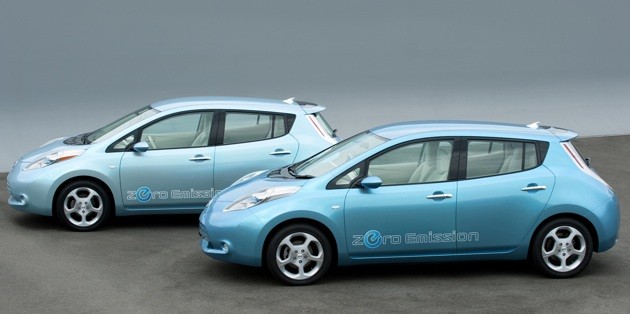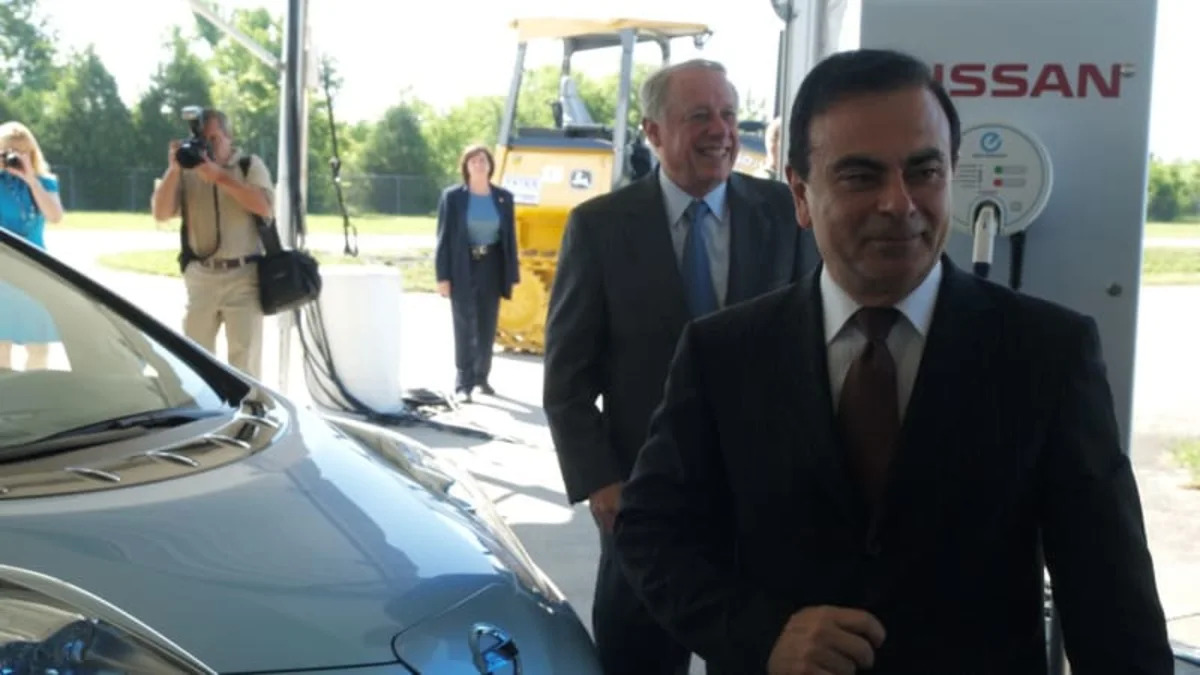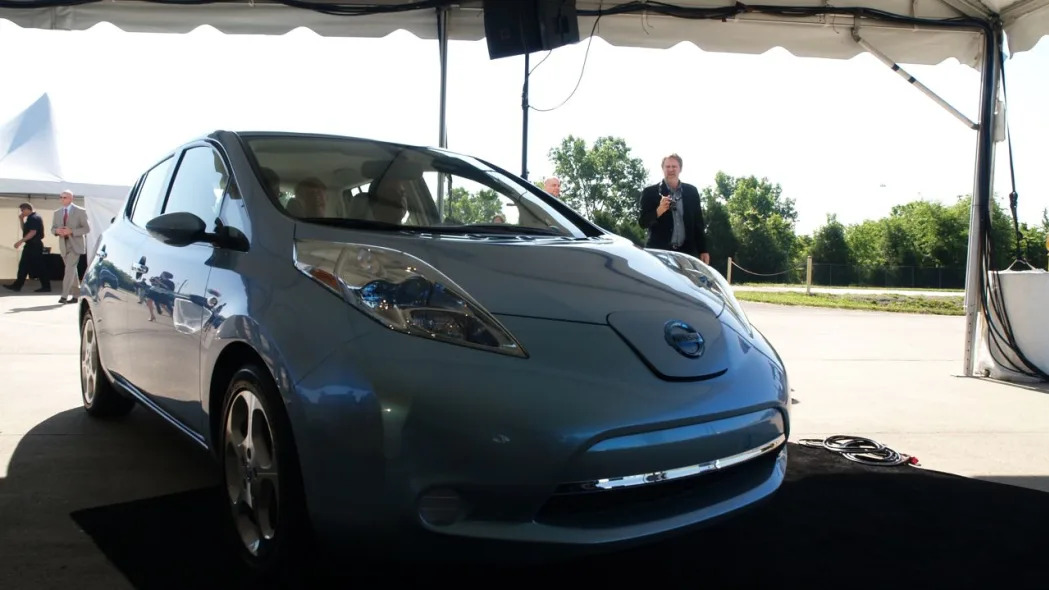Every time we hear Nissan CEO Carlos Ghosn speak, he kind of bowls us over with his strong belief in the all-electric Leaf and plug in vehicles in general. At the groundbreaking for the Smyrna, Tennessee battery plant last week, he once again expressed complete enthusiasm for electric vehicles (EVs). Yeah, we weren't surprised, either, but it was still good to hear this much hasn't changed. Here's how Ghosn described the Leaf in its current state:
nothing
, something. Read on after the jump to learn more about the man who doesn't stop giving EVs their due and why he'd much rather you lease the Leaf battery than buy it.
Don't just ask Ghosn, though. He said the people are speaking up in favor of the car in big ways. On top of the 13,000 Leaf reservations, which exceeds Nissan's available Leaf production capacity this fiscal year, 130,000 people have registered their interest in a Leaf. Online is where it's at, Ghosn said:Just last week, I drove the Leaf to confirm its performance and I can tell you this is a car for the 21st Century. It's a roomy five-seater with a spacious trunk. Its IP system gives the driver useful information, not just about the car, but connecting the car to its environment, acceleration is immediate, stability is great, driving is a pleasure. On top of all of this, we have the quiet, clean, eco-friendly benefits of a zero-emission car.
Well, we guess that'sThe Nissan Leaf is creating a class of its own, and customers are ready to receive it. One signal of its excitement is on Facebook, where more than 54,000 people "like" the Nissan Leaf. In fact, more people like the Leaf than any other environmentally friendly car sold today, and this is before our first sale.
Photos by Sebastian Blanco / Copyright ©2010 Weblogs, Inc.
Readers may remember that Nissan originally wanted to sell the car but lease the battery in the U.S., but decided against it for legal and customer incentive reasons. Still, Ghosn said he likes that model, and a sell/lease option is still likely in other markets, though. Here how Ghosn explained it:
Why does Nissan prefer to lease the pack? Ghosn said:Our basic system is to lease the battery. Now, we cannot systematically do it in all markets because, from time to time, for the consumer to get the benefit of the incentive, you cannot sell the car and lease the battery. You have to sell the car and sell the battery or lease the car and lease the battery. So, we are tweaking the system by accepting to sell the car and the battery when the consumers want to buy the car.
Asked about the recent Tesla/Toyota tie-up, Ghosn said he wasn't surprised that Toyota is making another entry into the EV market and that all the automakers will follow (if they haven't already). "Mark my words," he said. "They will a come to [electric cars]." If you want two billion cars on the planet, there is no way to do it other than with zero emission vehicles, be they powere by batteries or fuel cells, he said. As much as he's pushing for EVs now, Ghosn said he believes fuel cells will make up the second wave of the zero-emission vehicles. Ghosn als denigrated hybrids, saying that putting two powertrain systems into one car, "won't go beyond a niche product."We want to be able to renew the battery and not get the consumer involved in the battery technology. We guarantee to the consumer the use of the battery. They would pay a monthly fee for this use, but we own the battery and we change the battery and we maintain the battery and we recycle the battery. So we get the consumer out of the battery business, that's our basic system.
On the subject of mechanical complexity, Ghosn said that because there are fewer parts in an EV, they are fundamentally less expensive than an ICE vehicle, even if the batteries add huge costs now. He was also entirely confident that economies of scale will make this expecte price decrease a reality.

This brings us to Nissan's profitability prospects with the Leaf. Ghosn didn't (couldn't?) give any specifics about when the car would make money, but he did say it would differ depending on markets and changing monthly predictions. Still, he said, the car will be a moneymaker because zero-emission vehicles are a "fundamental need." Ghosn said he expects gas prices to trend upwards, which can only help push people to electric cars. Put all of this together and – never mind what some analysts say – Ghosn doens't think the Leaf is a risky proposition.
One part of our interview with Ghosn, though, left us scratching our head. While speaking about his confidence that the Leaf will be a truly affordable vehicle for people, he gave some numbers about pricing that were just wrong. He said:I would not be driving all of this if I saw a risk. I see a huge opportunity to play a major role in transforming the industry and transformation the transportation system. I see a huge opportunity for even changing the image of the company as a forward-looking one.
What? It's not fair to compare a full charge in a Leaf that goes around 100 miles to a gasoline fill-up that will move a car hundreds and hundreds of miles. To make this comparison legit, you'd either need to include a gas-powered car that goes 100 miles on a full tank (so, maybe, 10 miles per gallon) or a car with a teeny-tiny tank (say, 3.3 gallons in a 30 mpg car). To fill that small tank for $50 would require a gallon of gas to cost like $15, which is just kind of silly in the near term. If Ghosn wants to make the case using numbers again, he's going to need a bit of education to learn just how much gas costs in the U.S.[Leaf drivers are] going to pay three dollars to charge their car. Three dollars. It's going to be a big difference. Today, you're going to go "charge" your car, no matter what it is, you pay, what, $50? This is a small car. Every time you go and charge the car, you see the difference. That's good. ... On top of the fact that you're paying $20,000 for the Leaf [in California, with all federal and state rebates], every time you go charge, you're going to pay $3 versus the other guy who has a similar car who's going to pay $50 for the same transportation distance.
Still, we expect that Nissan really does have a hit on its hands. Facebook fans are one thing, but the time is soon coming where the vehicles will be available and some people can finally put their money where their mouths have been. For the first two years, all Leafs will be made in Japan before the new U.S and UK plants come on line. Even though there will be capacity constraints, Ghosn said, they might be short-lived:
Given that he was at a plant groundbreaking, Ghosn made sure to recognize the connection between the Leaf, which is due for a global roll-out in the coming years, and the place where he was speaking. Part of Nissan's strategy – just as it is for other OEMs – is to partner with governments to set the table for EVs. In Smyrna, there was a feeling of mutual admiration about the prospects. Tennessee governor Phil Bredesen said electric vehicle charging was "a fundamental part of the infrastructure of Tennessee." In fact, Tennessee was Nissan's first governmental partner in the U.S. "to commit to creating zero emission vehicles a viable and compelling choice for consumers," Ghosn said. Nissan now has more than 20 partners in the Americas and even more around the world. If Ghosn gets his way – and he certainly seems to, these days – even this series of accomplishments are but an early beginning for the coming big wave of electric cars.We have enough capacity to start the marketing of electric cars. But, if we see in December, when sales start, that the hand raising and pre-orderings transform fully into sales, we're going to have to make some decisions are additional capacity.
Our travel and lodging for this media event were provided by the manufacturer.



Sign in to post
Please sign in to leave a comment.
Continue